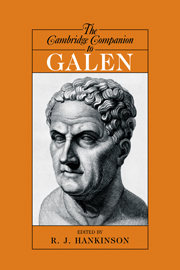Book contents
- Frontmatter
- 1 The man and his work
- 2 Galen and his contemporaries
- 3 Methodology
- 4 Logic
- 5 Language
- 6 Epistemology
- 7 Psychology
- 8 Philosophy of nature
- 9 Anatomy
- 10 Physiology
- 11 Therapeutics
- 12 Drugs and pharmacology
- 13 Commentary
- 14 The fortunes of Galen
- Appendix 1: A guide to the editions and abbreviations of the Galenic corpus
- Appendix 2: English titles and modern translations
- Bibliography
- Index
7 - Psychology
Published online by Cambridge University Press: 28 September 2008
- Frontmatter
- 1 The man and his work
- 2 Galen and his contemporaries
- 3 Methodology
- 4 Logic
- 5 Language
- 6 Epistemology
- 7 Psychology
- 8 Philosophy of nature
- 9 Anatomy
- 10 Physiology
- 11 Therapeutics
- 12 Drugs and pharmacology
- 13 Commentary
- 14 The fortunes of Galen
- Appendix 1: A guide to the editions and abbreviations of the Galenic corpus
- Appendix 2: English titles and modern translations
- Bibliography
- Index
Summary
Galen does not trouble to establish the soul's existence; rather, he simply takes it to be evident that it does, and thus that man and living things are composed of a body and a soul. As far as its nature and essence are concerned, however, there appear to be waverings and differences, in particular between the two texts principally dedicated to pyschological themes: the great treatise On the Doctrines of Hippocrates and Plato (PHP), which belongs to the writer's early mature period, and the late pamphlet The Faculties of the Soul Follow the Mixtures of the Body (QAM).
But it is not only this discrepancy between these major psychological works which poses problems for us. Remarks on the soul and its nature are scattered through several of his other works, and at first sight they seem to imply quite different conceptions of the soul, both in regard to its nature and concerning its relations with the body. Indeed, it has been supposed that Galen's views about the soul underwent a considerable evolution over time. But the exact point from which this evolution might be thought to have begun is controversial.
It is true that in the first book of the other great work of the author's maturity, On the Utility of the Parts (UP), which is roughly contemporaneous with PHP, Galen apparently talks in terms quite different from those he habitually employs elsewhere, since he speaks of the body as an instrument (organon) which the soul makes use of, which might seem starkly at odds with the other expressions he tends to use in this regard, and in particular with what he will say in QAM, where he posits a certain relation of dependence of souls and their capacities on the temperaments (kraseis: mixtures) of the bodies in which they reside.
- Type
- Chapter
- Information
- The Cambridge Companion to Galen , pp. 184 - 209Publisher: Cambridge University PressPrint publication year: 2008
- 20
- Cited by

